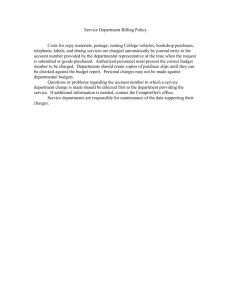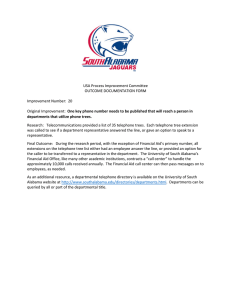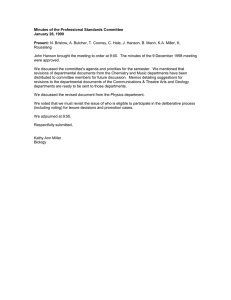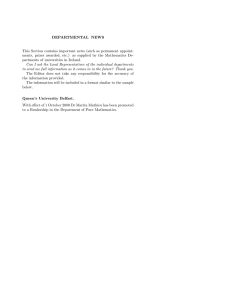The University is committed to ensure a high quality learning... doing so, we view the relationship between students and staff... GUIDELINES FOR WRITING A DEPARTMENTAL ASSESSMENT STRATEGY
advertisement
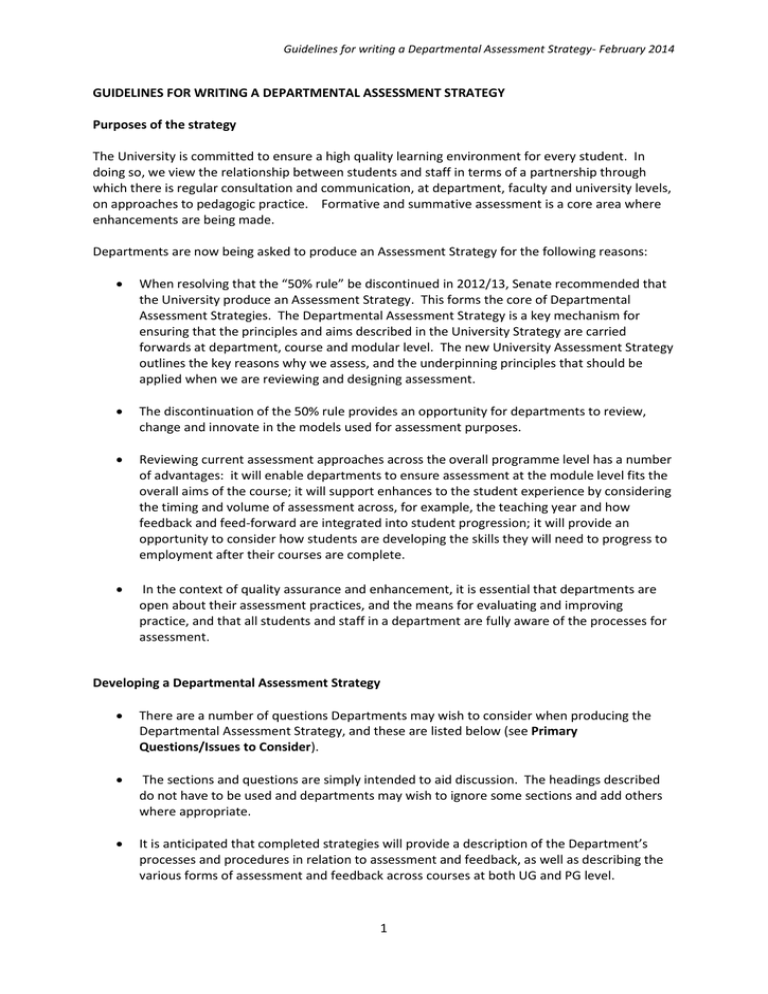
Guidelines for writing a Departmental Assessment Strategy- February 2014 GUIDELINES FOR WRITING A DEPARTMENTAL ASSESSMENT STRATEGY Purposes of the strategy The University is committed to ensure a high quality learning environment for every student. In doing so, we view the relationship between students and staff in terms of a partnership through which there is regular consultation and communication, at department, faculty and university levels, on approaches to pedagogic practice. Formative and summative assessment is a core area where enhancements are being made. Departments are now being asked to produce an Assessment Strategy for the following reasons: When resolving that the “50% rule” be discontinued in 2012/13, Senate recommended that the University produce an Assessment Strategy. This forms the core of Departmental Assessment Strategies. The Departmental Assessment Strategy is a key mechanism for ensuring that the principles and aims described in the University Strategy are carried forwards at department, course and modular level. The new University Assessment Strategy outlines the key reasons why we assess, and the underpinning principles that should be applied when we are reviewing and designing assessment. The discontinuation of the 50% rule provides an opportunity for departments to review, change and innovate in the models used for assessment purposes. Reviewing current assessment approaches across the overall programme level has a number of advantages: it will enable departments to ensure assessment at the module level fits the overall aims of the course; it will support enhances to the student experience by considering the timing and volume of assessment across, for example, the teaching year and how feedback and feed-forward are integrated into student progression; it will provide an opportunity to consider how students are developing the skills they will need to progress to employment after their courses are complete. In the context of quality assurance and enhancement, it is essential that departments are open about their assessment practices, and the means for evaluating and improving practice, and that all students and staff in a department are fully aware of the processes for assessment. Developing a Departmental Assessment Strategy There are a number of questions Departments may wish to consider when producing the Departmental Assessment Strategy, and these are listed below (see Primary Questions/Issues to Consider). The sections and questions are simply intended to aid discussion. The headings described do not have to be used and departments may wish to ignore some sections and add others where appropriate. It is anticipated that completed strategies will provide a description of the Department’s processes and procedures in relation to assessment and feedback, as well as describing the various forms of assessment and feedback across courses at both UG and PG level. 1 Guidelines for writing a Departmental Assessment Strategy- February 2014 Departmental Assessment Strategies need to be developed in consultation with the student body and in particular with SSLCs. Departments should involve partners/employers/PSRBs where appropriate. Where departments run joint degree programmes with other departments or institutions, the assessment strategy must be discussed with the partner departments/institutions before it is finalised to ensure that the departmental assessment strategy is appropriately aligned. It is expected that departments will take into account comments relating to forms of assessment in relevant QAA Subject benchmark Statements. Similarly it is expected that Departments will consult with accrediting bodies where appropriate. Once agreed, Departmental Assessment Strategies should be published and communicated appropriately. Thereafter it is expected that departments will review the departmental assessment strategy on an annual basis. Primary Questions/Issues to Consider 1. Developing the Assessment Strategy a) How will your Department develop its Assessment and Feedback Strategy? Which staff/ committees will be consulted? How will the student body be involved? b) How will the delivery and effectiveness of the strategy be monitored? Which staff/ committees will be responsible? c) What will be mechanism be for reviewing Department Assessment Strategy? d) In what ways does this strategy link into other policies or strategies within your Department? e) How will you liaise with partner departments/institutions/accrediting bodies? f) Does the department need separate assessment strategies articulated at PG/UG level or at course level? 2. Commitments: a) Are there any further commitments the Department wishes to make above those in the University Assessment Strategy? b) Is there any further detail the Department would like to add to the in the University Assessment Strategy? 3. Assessment Aims: a) What evidence do you have that a variety of assessment methods are being used, within modules or across programmes of study, to ensure the development of a broad range of skills relating to effective learning, research and employability? 2 Guidelines for writing a Departmental Assessment Strategy- February 2014 b) What is the balance between formative and summative assessment that you want within modules and courses? Does this vary according to the level of study? How will the Department audit its current module provision to ensure it supports this goal? c) How does the Department ensure that there is coherence throughout each course, and clearly defined progression through different stages of a course? How is this conveyed to students? d) How is feedback provided for both formative and summative work in a timely manner, i.e. do students know the results and have feedback before the next piece of assessed work? Is assessment staggered so that this can happen? e) What is the balance between examinations and other forms of assessment that you require? Are students clear about this? How will it be monitored? f) Do programmes offered by the Department provide an appropriate range of assessment methods for all years of study? g) In what ways is assessment used to monitor student performance throughout a module and course? Is there an annual discussion with students which allows them to take an overview of their performance during a year of study? h) Do students know the marking criteria that will be applied to their work? i) Are students clear about how each year of study counts towards their final degree classification? Are they clear about what they need to pass, and at what level, in order to achieve specific classifications? j) What mechanisms within the Department are used to monitor, review and update the range of assessments within modules and across programmes? k) Does someone have oversight of the scheduling of assessments to avoid bunching of assessments? l) How will the Department ensure that assessment is covering all of the learning outcomes both at modular and course level? How will the Department map the assessments at modular level against the course learning outcomes. m) What prevents your Department from achieving these aims? 3. Why Assess? a) How is it established that assessment and feedback is timely and progressive throughout a programme, and that it meets the course-level learning outcomes? b) In what ways is feedback used to encourage, guide and improve learning (does it allow feed forward?) 3 Guidelines for writing a Departmental Assessment Strategy- February 2014 c) How does the department ensure that forms of assessment equip students for employment? Does the department design assessment with employability skills in mind? 4. Underlying Principles Reliablilty a) Is the assessment offered reliable in that the results of an assessment are consistent through time and replicable? ie are the results obtained from sampling a student’s knowledge and skills representative of his/her true ability? b) Can those who rely on our assessment process (exam boards, employers, students etc) rely upon our outputs (marks and feedback)? Validity c) What processes are in place to ensure that assessment is correctly assessing the level of performance of our students? What moderation processes are used – are they ‘fit for purpose’? d) How are the various forms of feedback and feed forward monitored within the department to ensure best practice? e) How do we ensure that assessment is fit for purpose? Is it developing academic and employment skills? Is it aligned to learning outcomes? Equity f) Are assessments as ‘plagiarism-proof’ as possible? g) How does the Department ensure that students cannot use forms of cheating? h) Are assessments culturally biased? i) Are new students offered the chance to improve their skills in certain forms of assessment they may not have encountered at school/other universities? j) What considerations need to be made for students on joint or collaborative courses? Timeliness k) Does assessment happen at the right times to move students’ learning forwards? Does feedback happen in time to feed in to upcoming assessments? Manageability l) Is the assessment load evenly spread across each academic year AND across the degree programme as a whole? If the students are on joint degrees how do we make sure this 4 Guidelines for writing a Departmental Assessment Strategy- February 2014 happens? What can we do to mitigate against ‘clumps’ of assessment? Are the students aware how to seek help/request extensions? Inclusivity m) Are assignments designed with the needs of all students in mind? n) Are the mechanisms processes for ensuring that the needs of all students are met adequate? o) If recommended by the appropriate body, do students with disabilities have access to alternative comparable assessment tasks? Does someone in the Department have oversight of this? 5. Supporting colleagues to deliver assessment and feedback a) What support will there be for new and existing staff to support them to engage with assessment and feedback requirements? b) What is the Department policy for ensuring that all staff involved with assessment receive appropriate training, (eg. on university regulations, Department policies and good practice), or receive appropriate opportunities to attend relevant university-provided and external training and development events? c) How are colleagues supported to design forms of assessment which help to prevent cheating? Eg learning outcomes which reflect the desire for students to find things out for themselves, which provide variety eg posters, oral presentations, literature searches, article reviews, correct scheduling of assessments, design of questions and tasks, tracking and integrating assessments, writing assessment criteria which reward referencing and citation, individuality and reflection, and so on…. d) Does the Department feel that there is a gap in terms of training and development for staff that cannot be filled locally – for example in forms of assessment such as reflective journals, portfolios, blogs? e) Does the department use any forms of Computer Aided Assessment (CAA)? f) What is the Department’s policy on training and induction for Postgraduate Research Students involved in the assessment of undergraduate students? g) In what ways do you use do you currently use any form of technology to support formative or summative assessment and associated feedback? 6. Communication a) In what ways does the Department provide explicit, written guidance on arrangements for assessment and feedback (eg. published in Department handbooks and websites), and is this provided for all students, markers and examiners? 5 Guidelines for writing a Departmental Assessment Strategy- February 2014 b) Does the Department have a set of publicly available Department/Discipline-specific assessment criteria aligned to the University marking criteria? c) Are these criteria clear to students when assessment is set? How is it ensured that students understand the marking criteria for any assignment? d) In what ways can it be demonstrated that feedback demonstrates a correlation between the mark given, the markers comments and the criteria provided in advance? e) Does the strategy address feedback on examinations and feedback on dissertations? 7. PSRBs/Employers a) How does the Department involve PSRBs and employers in the design of assessment? b) What careers do the Department’s students follow? Does the Department seek information about the skills that employers in those areas value? c) Are the students clear about the requirements of accrediting bodies? These questions draw on an assessment audit developed by the Centre for Bioscience, at the Higher Education Academy as well as the Assessment Strategy guidance written by the University of Exeter. For more information about this HEA audit please see: http://www.bioscience.heacademy.ac.uk/resources/audit.aspx. If you have any questions about this document, please contact Teaching Quality in the first instance: quality@warwick.ac.uk 6
